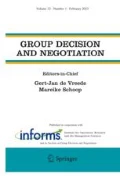Abstract
This clinical paper suggests applying a new Rorschach measure, the Reality-Fantasy Scale (RFS; Tibon et al. 2005, Int J Appl Psychoanal Stud 2:40–57) for evaluating patterns of functioning in negotiation processes. The RFS is a psychoanalytically oriented diagnostic tool, designed to operationalize Winnicott’s (Playing and reality. Basic Books, New York, 1971) construct of potential or transitional space by using a paradigm that conceptualizes the Rorschach task as inviting the respondent to enter the intermediate transitional space between inner and outer reality. The RFS ranges from − 5, representing extreme reliance on fantasy (reality collapse) to + 5 representing extreme reliance on reality (fantasy collapse). A score approximating zero indicates adaptive and functional use of potential space, pointing out high level of negotiator effectiveness. A case example is presented, demonstrating the utility of the RFS in evaluating negotiator effectiveness in an encounter aimed at achieving peace agreement. Although not itself a report of a lab or field experiment the paper illustrates the potential usefulness of psychoanalytically oriented conceptualization and clinical assessment methods in negotiation research and practice.
Similar content being viewed by others
References
Akhtar S (2002). Editor’s introduction: psychoanalysis and politics. Book review and Commentary. J Appl Psychoanal Stud 4: 247–248
Brodt SE (1997). Innovative approaches to research on group decision and negotiation. Group Decis Negot 6: 283–287
Bromberg P (1993). Shadow and substance: a relational perspective on clinical process. Psychoanal Psychol 10: 147–168
Exner JE (2003). The Rorschach: a comprehensive system, vol. 1, Basic foundations, 4th ed. Wiley, NY
Faure GO (1999). The cultural dimension of negotiation: the Chinese case. Group Decis Negot 8: 187–215
Freud S (1921). Group psychology and the analysis of the ego. Stand Ed 18: 67–144
Greenhalgh L and Gilkey RW (1997). Clinical assessment methods in negotiation research: the study of Narcissism and negotiator effectiveness. Group Decis Negot 6: 289–316
Leichtman MB (1996). The Rorschach: a developmental perspective. Analytic Press, Hillsdale, NJ
Meloy JR, Acklin MN, Gacono CB, Peterson CA (eds) (1997). Contemporary Rorschach interpretation. Lawrence Erlbaum Associates, Mahwah, NJ
Meyer GJ, Erdberg P and Shaffer TW (2007). Toward international normative reference data for the comprehensive system, international monograph supplement. J Pers Assess 89(S1): S201–S220
Mitchell SA (2000). Relationality from attachment to intersubjectivity. The Analytic Press, Hillsdale, NJ
Ogden TH (1989). Playing, dreaming and interpreting experience: comments on potential space. In: Fromm, M and Smith, B (eds) The facilitating environment: clinical applications of Winnicott’s theory, pp 255–278. International Universities Press, Madison, CT
Orange D, Atwood G and Storolow R (1997). Working intersubjectively: contextualism in psychoanalytic practice. Analytic Press, Hillsdale, NJ
Pizer SA (1996). Negotiating potential space: illusion, play, metaphor and the subjunctive. Psychoanal Dialogues 6: 689–712
Pizer SA (1998) Building bridges: the negotiation of paradox in psychoanalysis. Analytic Press, Hillsdale, NJ
Schafer R (2002). Psychoanalytic interpretation in Rorschach testing: theory and application. Grune & Stratton, New York
Smith B (1990). Potential space and the Rorschach: application of object relations theory. J Pers Assess 55: 756–767
Thompson LL (1990). Negotiation behavior and outcomes: empirical evidence and theoretical issues. Psychol Bull 108: 515–532
Tibon S (2000) Personality traits and peace negotiation: integrative complexity and attitudes toward the Middle East peace process. Group Decis Negot 9:1–15
Tibon S (2007). Rorschach comprehensive data for a sample of 41 adult nonpatients from Israel, International monograph supplement. J Pers Assess 89(S1): S80–S84
Tibon R, Suchowski R (2005) The RFS Software. www.rfscale.com
Tibon S, Handelzalts JE and Weinberger Y (2005). Using the Rorschach for exploring the concept of transitional space within the political context of the Middle East. Int J Appl Psychoanal Stud 2: 40–57
Twemlow SW (2005). The relevance of psychoanalysis to an understanding of terrorism. Int J Psychoanal 86: 957–962
Viglione D, Perry W and Meyer GJ (2003). Refinements in the Rorschach ego impairment index incorporating the human representational variable. J Person Assess 81(2): 149–156
Weiner IB (2003). Principles of Rorschach interpretation. Lawrence Erlbaum Association, Mahwah, NJ
Winnicott DW (1971). Playing and reality. Basic Books, New York
Author information
Authors and Affiliations
Corresponding author
Rights and permissions
About this article
Cite this article
Tibon, S. Applying Clinical Methods for Assessing Patterns of Functioning in Negotiation Processes: The Rorschach Reality-Fantasy Scale (RFS). Group Decis Negot 17, 541–552 (2008). https://doi.org/10.1007/s10726-008-9110-5
Received:
Accepted:
Published:
Issue Date:
DOI: https://doi.org/10.1007/s10726-008-9110-5




